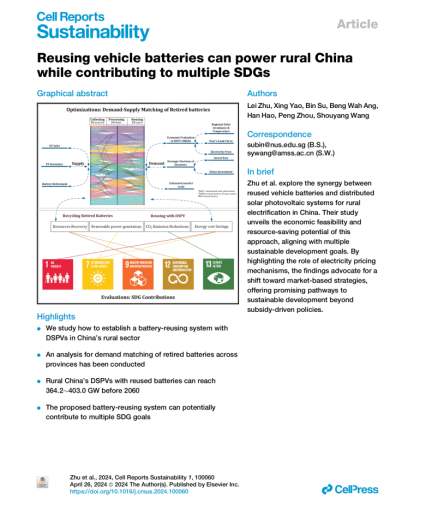Recently, Professor Zhu Lei and Assistant Professor Yao Xing from the SEM at Beihang University, along withtheircollaborators, have made new progress in the research on promoting thereuseof retired power batteries in China. The research titled "Reusing Vehicle Batteries Can Power Rural China while Contributing to Multiple SDGs,"waspublished on April 26, 2024, in the journal "Cell Reports Sustainability," a subsidiary of "Cell." Professor Zhu Lei and Assistant Professor Yao Xing are the co-first authors. Dr. Su Bin from the Energy Research Institute at the National University of Singapore and Professor Wang Shouyang from the School of Economics and Management at the University of Chinese Academy of Sciences are the co-corresponding authors. The author team also includes Professor Hao Han from the School of Vehicle and Mobility at Tsinghua University and Professor Zhou Peng, the vice president of China University of Petroleum (East China).

SUMMARY
With the increasing electrification of road transport in China, there is a need to put eyes on the disposal of retired batteries. Reusing the retired batteries for rural electrification presents great promise, but this possibility has not been comprehensively investigated. We study how to contribute to sustainable development goals and carbon neutrality in China by establishing a battery-reusing system in rural residential sector from 2021 to 2060. Our results show that, before 2060, the accumulated rural residential installations of distributed solar photovoltaics with reused batteries can reach 364.2 403.0 GW. The avoided annual CO2 emissions range from 505.9 to 536.4 million tons, and the total recovered lithium and cobalt from retired batteries will be no less than 88.8% and 60.0% of their respective 2021 global mining volumes. The system is believed to introduce changes to subsidy-driven policy to promote sustainable development by transitioning to one that is market based.